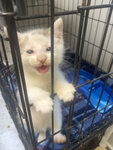

The Storm Lake City Council approved an agreement with Lake Animal Hospital, ensuring the city will pay sheltering and associated costs for five days after a stray arrives.
The agreement comes nearly four months after Dr. Dianne Johnson submitted a letter to the city asking for financial help in housing and treating stray animals. For years, the vet clinic has doubled as an animal shelter, taking in unclaimed animals from the Storm Lake Police Department.
“We were overwhelmed with stray animals, we realized vaccination prices have gone up, time workers spend here has gone up,” said Johnson. “We’re losing money with every stray we take in.”
Johnson wrote her initial letter on Feb. 19, shortly after a series of animal hoarding operations burdened the clinic’s staff and resources. In April, the clinic said they were still recovering from caring for dozens of cats from a Michigan Street residence for the third time in a four-year span.
“Unfortunately, the current relationship with the City is not sustainable because of the financial strain on the Lake Animal Hospital to handle and manage the stray population,” Johnson wrote in the initial letter. “We hope that a new agreement can be reached with a realistic cost the city is willing and able to pay for the caring of the neglected, abandoned and abused strays.”
Since April, the city council has discussed Dr. Johnson’s proposed funding agreement at three meetings. Johnson said she met separately with Keri Navratil, city manager, and Chris Cole, Storm Lake police chief, to iron out the terms of the agreement. City council approved the final agreement last Monday with no pushback.
Councilperson Meg Mc-Keon said she was happy to finalize the agreement so that the animal hospital would no longer work at a deficit.
The clinic will continue to provide shelter services to animals the city delivers in response to neglect or abuse investigations. Under the new agreement, the city will be responsible for the cost of services during the shelter period. Associated services include labor, food, vaccinations, virus tests and microchipping.
Dr. Johnson had hoped for microchipping
Though Johnson originally requested the city pay for a seven-day shelter period for each stray, the final agreement outlines a five-day shelter period. “I thought that was what they wanted, but I guess it was longer than they wanted,” Johnson said.
Johnson also asked that the city pay $115 to cover the cost of each feline intake, and $135 per dog intake. The city agreed to cover all requested cat intake costs, which includes vaccinations, boarding and testing for feline leukemia and feline immunodeficiency virus. The city agreed to cover nearly all requested dog intake costs, excluding heartworm tests and microchipping.
Johnson explained that microchipping cats and dogs saves the vet clinic and the city money. When a police officer arrives at Lake Animal with a stray, a microchip helps the clinic locate an owner much faster and therefore cuts down sheltering expenses.
Any dog or cat that comes to the clinic after biting a human will be quarantined for 10 days and afterwards administered a rabies shot. The city will not be responsible for paying $300 for the quarantine.
The clinic uploads pictures and descriptions of each stray animal on its Facebook page to search for an owner. After seven days unclaimed, the animals become the vet clinic’s property. Johnson said it has been difficult to find new people to adopt the strays, especially the older animals. Wallee, the clinic’s longest feline resident, has been there since last fall.
Ultimately, Johnson said with the agreement, she does not believe Lake Animal will become insolvent.
“I kept the prices just to break even,” she said. “I’m not trying to make money off these strays, I just want to pay my workers and pay my bills.”